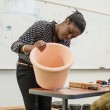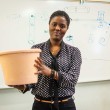Civil engineering students at California Baptist University are dedicating their capstone project for research in an effort to help provide clean drinking water for the people of Ngoma, Rwanda.
At the beginning of the fall 2013 semester, senior civil engineering majors Rosa Mystica Akimana, Linneah Gomez, Florent Tuyizere and Mina Bishara were inspired to help give people across the globe access to clean drinking water.
As a Rwandan international student, Akimana has a great awareness of the needs in a developing country.
“Growing up in a community that has limited access to clean water has definitely inspired me to work on water-treatment projects.” Akimana said. “I have seen people suffering and dying from waterborne diseases.”
The group has been testing inexpensive ceramic water-filtration methods to be implemented in developing countries that cannot finance expensive filtration methods.
The group’s goal is to take an already existing model of a filtration system and test its effectiveness. Their research includes finding the most cost-effective and easily accessible materials in developing countries that will produce the purest water.
The filter is a pot made from clay and sawdust that is approximately the size of a 7-gallon bucket. Inside, the container has layers of biosand, a fine sand and gravel thatproduces a biofilm when contaminants pass through. Together these materials produce a practical filter.
The group designed the filtration system to allow the water to flow through the gravel first to catch bacteria. Biosand is layered with the gravel to catch any viruses the gravel might have let through.
Gomez said that she hopes their project will make others more aware of the hardship, struggle and pain many people face in developing communities and imprint a different perspective on life.
“Too often even the most simple things in life are taken for granted; the food on our plates, the clothes on our backs and the roofs over our heads,” Gomez said.
Akimana said that beyond the construction of filtration systems, the effort to provide clean drinking water to developing communities faces other problems. She explained that locals often do not trust outsiders who bring water filters and even the most cost effective water filters can still be too expensive for locals to purchase..
“The first thing is trying to convince those people how it is important to drink clean water,” Akimana said.
She suggested establishing a relationship with the local community and authorities as an important first step in bringing this technology to developing countries and convincing them of the benefits of clean drinking water.
“We’re solution-providers,” Akimana said about engineering students.
Although research will continue, Akimana and Gomez are confident that their training in engineering will help people around the world.




